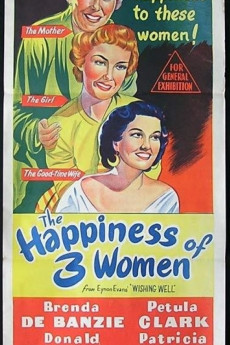Wishing Well

THE HAPPINESS OF THREE WOMEN is one of the last of the three hundred odd films to be made by veteran English director Maurice Elvey and one which he held in some regard, using it in his teaching work after his retirement.While this in not a major work to be compared with his silent THE LIFE OF DAVID LLOYD GEORGE the recent discovery of which has signaled the neglect which his industry and film scholars treated Elvey, THE HAPPINESS OF THREE WOMEN is welcome for those alarmed by the unsuitable productions given Elvey in his final active years.Based on a then popular play by Welsh bus driver Evans, who plays the conniving postman in the film, this centres on the Wishing Well Inn run by De Banzie who Evans is trying to lure away from sleeping with her hot water bottle.Three bookings are made, a nurse with a tragic past, a Korea veteran and a housemaid become rich. Evans efforts to solve their problems are played out in the manner of the British films of the day – not all that far removed from the first, black and white "Carry On…"films where the knockabout was marginal to a sentimental main plot. Best element is the proposed marriage between Petula Clarke and then star Donald Houston as De Banzie’s wheelchair bound son, the local school teacher. This has conviction and restraint and the sub-plots keep attention switching skillfully.Film-making is more adept than the work being done around it, with the camera placed in the middle of the action avoiding stage quality and the Welsh locations and Nettlefold studio shooting effectively integrated. This comes early in the transition to wide screen filming and handles the new format without any problems. The pacing, normally sluggish in English films of the day, is brisk. Patricia Cutts and Donald Houston’s brother Glynn even manage a quite sensual bedroom scene out of character with the known Elvey films.Now, like the body of it’s maker’s work almost never seen, THE HAPPINESS OF THREE WOMEN makes a disturbing reminder that the most remarkable English film maker of the silent period remained active and retained his skills long after commentators had forgotten his major work.






Leave a Reply
You must be logged in to post a comment.